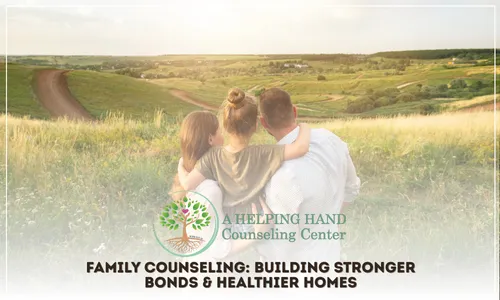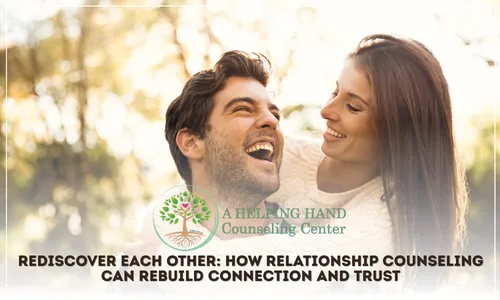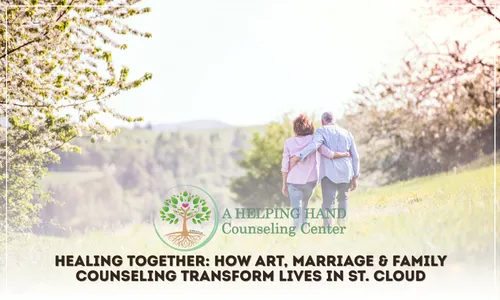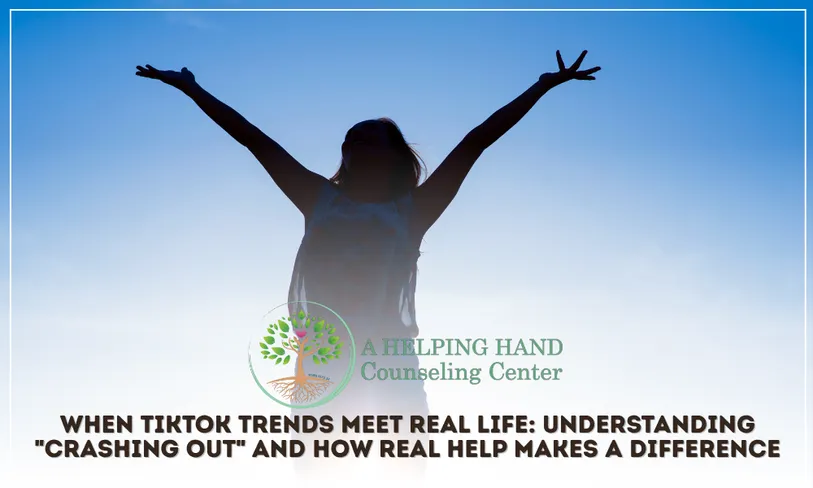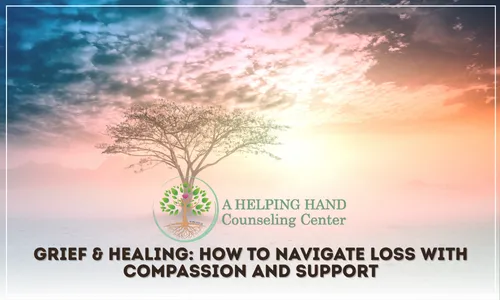
Grief & Healing: How to Navigate Loss with Compassion and Support
At A Helping Hand Counseling Center, we understand how isolating grief can feel. That’s why our therapists provide compassionate support, helping you process your emotions, build resilience, and begin moving forward at your own pace.
In this post, we’ll explore:
- The many faces of grief
- Common misconceptions about grieving
- Practical tools and rituals to support healing
- When it might be helpful to seek grief counseling
- How our services can support you during this season
Let’s start moving together—one kind step at a time.
1. Understanding Grief: It’s More Than Sadness
Grief isn’t just sadness. It’s a complex tapestry of emotions—anger, guilt, relief, confusion, even numbness.
People often describe grief as waves: you can be fine, then—whoosh—an emotional wave hits out of nowhere.
Common grief reactions include:
- Denial or Shock: “This can’t be real.”
- Anger or Frustration: “Why did this have to happen?”
- Guilt or Regret: “If only I’d said …”
- Anxiety or Worry: “How will I manage?”
- Relief and Letting Go: Mixed with guilt, sometimes.
- Loneliness or Emptiness: Even in a full room.
Grief is not a linear process. It’s okay to cycle through feelings—or stay stuck in one longer than you expected.
2. Common Myths That Can Make Grief Harder
Grief is personal, but certain societal messages make it even harder:
Myth #1: “You should feel better by now.”
Reality: There’s no timeline for grief. Healing is messy and individual.
Myth #2: “Stay strong for the kids.”
Reality: Modeling emotion is powerful. Showing vulnerability teaches your children healthy coping.
Myth #3: “Time heals all wounds.”
Reality: Time gives space—but you still need active self-care and emotional support to heal.
Myth #4: “It’s just sadness.”
Reality: Grief is emotional, mental, spiritual, and physical. It can hurt your body and your soul.
3. Practical Ways to Cope and Heal
Here are compassionate, action-oriented steps you can take during times of grief:
A. Create Gentle Rituals
- Light a candle or create a small memorial space
- Write a letter to the person you lost
- Plant a tree or dedicate a memory box
Small, personal rituals help you express what the words can’t.
B. Keep a Grief Journal
- Write about your day-to-day emotions
- Track moments when you feel triggered
- Write one thing each evening that brought you comfort
This helps you spot patterns and validate your healing journey.
C. Find Support
- Lean on trusted friends or family
- Join a grief support group, either in person or virtual
- Use counseling to explore and process emotions more deeply
🔗 Learn more about Individual Therapy
D. Schedule Emotional Rest
Grief is exhausting. Let yourself slow down—sleep, comfort foods, restful walks, or a warm bath. Honor your body’s need to reboot.
E. Use Physical Sensation for Emotional Grounding
When overwhelmed:
- Place your hand over your heart and breathe
- Hold an ice cube or splash cold water on your face
- Walk barefoot on grass or sand
You can catch your mind and bring yourself back into the present.
F. Set Comfort Zones with Relationships
It’s okay to say:
- “I need space to be alone tonight.”
- “Would you mind just sitting with me, without talking?”
Learning to say “no” is a form of self-care.
4. When to Seek Grief Counseling
Sometimes grief becomes overwhelming, and you might need professional help if you experience:
- Intense grief that lasts months or years and interferes with daily life
- Thoughts of harming yourself or severe hopelessness
- Persistent guilt, self-blame, or shame
- Avoidance of reminders or people connected to your loss
- Severe anxiety, panic, insomnia, or loss of appetite
Grief counseling at AHHCC offers a private, compassionate partnership, with therapists skilled in trauma-informed care, EMDR, and IFS.
🔗 Explore our Trauma & PTSD Services
5. Healing Through Counseling at AHHCC
Here’s how our team supports you through grief:
- Individual Therapy: Weekly sessions focused on your healing pace
- EMDR or ART: Trauma-informed tools for navigating traumatic loss
- Family Counseling: Supporting collective grief with children and partners
- Telehealth Sessions: Comfort of home for easier access
- Supportive Environment: No judgment, only kindness and space to grieve
We’ll help you learn self-compassion, build emotional strength, and create new meaning on the other side of loss.
Final Thoughts: Grief Takes Courage
Grief is unfamiliar territory—but you don’t have to walk it alone. Whether this is fresh loss or a wound that feels frozen in time, healing is possible.
It often starts with a single step: a phone call, a conversation, a small act of self-care. If you’ve made it this far, maybe today is that step.
✨ Start Healing Today
You are not alone—and your feelings are valid.
📞 Call (407) 450-5985
📍 Or request an appointment online for grief support tailored to you or your family.
A Helping Hand Counseling Center
- 303 Commerce Center Drive St. Cloud, FL 34769
- teamcare@ahhcounseling.com
- (407) 450-5985
- www.ahhcounseling.com
Subscribe to Our Newsletter
Posts Category
Most Popular Posts
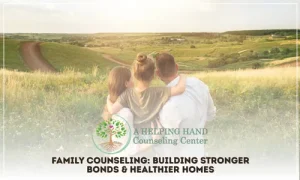
Family Counseling: Building Stronger Bonds & Healthier Homes
In a world where daily life can feel overwhelming, the importance of mental health counseling has never been more apparent. Whether you’re facing stress, anxiety,
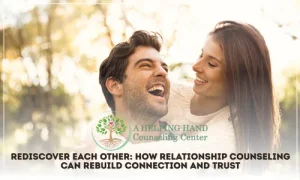
Rediscover Each Other: How Relationship Counseling Can Rebuild Connection and Trust
Struggling with disconnection, conflict, or emotional distance? Learn how relationship counseling can help couples rebuild trust, communicate better, and grow together. Every relationship tells a
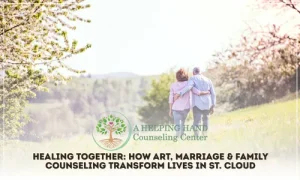
Healing Together: How ART, Marriage & Family Counseling Transform Lives in St. Cloud
Discover how Accelerated Resolution Therapy and marriage & family counseling at A Helping Hand Counseling Center in St. Cloud, FL can help you heal trauma,
Subscribe to Our Newsletter


